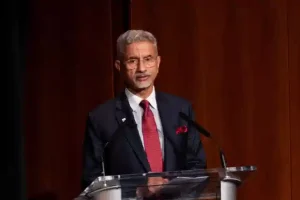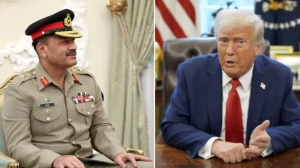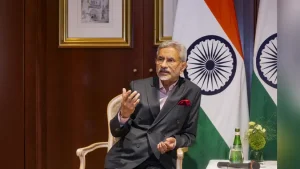New Delhi – External Affairs Minister S Jaishankar delivered a scathing critique of Jaishankar On US Pak Ties during a major international forum, reminding the United States of its complex history with Pakistan and specifically mentioning the discovery of Osama Bin Laden in the Pakistani military town of Abbottabad. His sharp observations about Jaishankar On US Pak Ties drew loud applause from the audience as he highlighted America’s tendency to overlook historical realities.
Historical Pattern of Overlooking Past

Jaishankar On US Pak Ties revealed a pattern of deliberate historical amnesia, with the External Affairs Minister stating that both countries “have a history with each other and a history of overlooking that history.” This pointed observation about Jaishankar On US Pak Ties came amid growing concerns about America’s renewed engagement with Pakistan under the Trump administration.
The minister’s commentary on Jaishankar On US Pak Ties emphasized that this is not the first time such dynamics have played out, suggesting a cyclical nature to American-Pakistani relations that consistently ignores past betrayals and security concerns. His analysis indicates deep frustration with repeated American attempts to rehabilitate Pakistan despite its questionable track record.
Osama Bin Laden Abbottabad Reminder


In a particularly striking moment of his speech about Jaishankar On US Pak Ties, the minister specifically referenced the 2011 discovery of Osama Bin Laden in Abbottabad, a Pakistani military garrison town. This pointed reminder served as a powerful rebuke to American efforts to trust Pakistani military assurances.
Jaishankar On US Pak Ties included this direct challenge to American policy makers: “It’s the same military which went into Abbottabad and found you know who there.” This reference to the world’s most wanted terrorist being discovered in a Pakistani military town underscored the minister’s argument about the fundamental unreliability of Pakistani security commitments.
Politics of Convenience Criticism
The External Affairs Minister’s analysis of Jaishankar On US Pak Ties centered on what he termed the “politics of convenience,” where countries prioritize short-term tactical gains over long-term strategic clarity. His critique suggested that American engagement with Pakistan represents expedient decision-making rather than principled foreign policy.
Jaishankar On US Pak Ties highlighted how such convenience-based relationships often ignore fundamental security concerns and historical precedents. The minister’s observations indicated that India views American-Pakistani engagement through this lens of tactical expediency rather than genuine strategic partnership.
Trump’s Pakistan Engagement

Recent developments prompting Jaishankar On US Pak Ties commentary include President Donald Trump’s invitation to Pakistan Army Chief Asim Munir to the White House, signaling renewed American interest in Pakistani military leadership. This high-level engagement has raised concerns in New Delhi about potential shifts in regional power dynamics.
Also Read: Sergio Gor Named India Ambassador: Trump’s Controversial Choice Sparks Debate
The minister’s response to questions about increasing American-Pakistani closeness in Jaishankar On US Pak Ties reflected India’s strategic concerns about being marginalized in regional security discussions. His measured but firm response indicated India’s determination to maintain its position despite changing bilateral dynamics.
Operation Sindoor Ceasefire Clarification
A significant portion of Jaishankar On US Pak Ties addressed President Trump’s claims about mediating the India-Pakistan ceasefire during Operation Sindoor. The minister categorically denied American mediation while acknowledging that phone calls were made during the conflict period.
Jaishankar On US Pak Ties clarified that while the United States and other countries contacted both sides during the hostilities, the actual ceasefire negotiations occurred directly between New Delhi and Islamabad. This distinction was crucial in countering American claims of successful diplomatic intervention.
International Communication During Conflicts
The minister’s explanation about Jaishankar On US Pak Ties included broader context about international diplomatic communications during conflicts. He emphasized that countries naturally reach out to conflicting parties, citing his own calls during Israel-Iran tensions and Russia-Ukraine hostilities as examples.
Jaishankar On US Pak Ties distinguished between routine diplomatic communication and actual mediation, stating that every phone call with American officials was documented on his social media accounts. This transparency contrasted sharply with American attempts to claim mediation credit.
India’s Strategic Confidence


Despite criticisms embedded in Jaishankar On US Pak Ties, the minister emphasized India’s strategic confidence and the structural strengths of India-US relations. He indicated that India responds to daily challenges while maintaining focus on long-term relationship fundamentals.
Jaishankar On US Pak Ties reflected India’s mature approach to managing complex trilateral dynamics, with the minister stating: “I know what I am about. I know what my strengths are, I know what is the importance and relevance of my relationship.” This confidence suggests India’s ability to navigate American-Pakistani engagement without compromising its own interests.
Broader Implications for Regional Dynamics
The minister’s comprehensive analysis of Jaishankar On US Pak Ties carries significant implications for South Asian geopolitics and American foreign policy in the region. His public critique represents India’s willingness to challenge American strategic calculations when they conflict with Indian security interests.
The timing and venue of Jaishankar’s remarks about Jaishankar On US Pak Ties at an international forum suggest deliberate messaging to global audiences about India’s strategic autonomy and its expectations from American policy makers regarding regional engagement patterns that ignore historical realities and security concerns.

